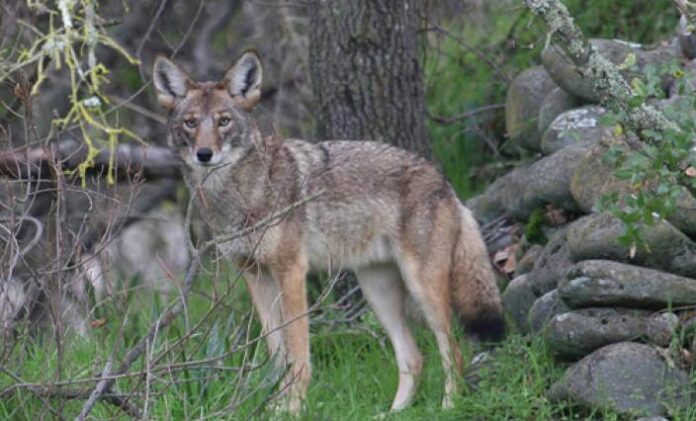CULLMAN, Ala. – The Tribune has received an increasing number of reports of coyotes spotted in and around the city limits of Cullman over the last several months. While coyotes do pose a threat to pets and livestock, with pets under 35 pounds being at greatest risk, there has never been a reported coyote attack of a person in the state of Alabama.
The Tribune spoke to naturalist and wildlife biologist Marianne Hudson, conservation outreach specialist with the Alabama Wildlife and Freshwater Fisheries Division of the Alabama Department of Conservation and Natural Resources.
According to Hudson, there are several things people do that inadvertently attract coyotes, such as leaving pet food out overnight, leaving out smelly trash cans and even having outdoor cats.
“Coyotes will eat outdoor cats,” she said, “so having feral cats outside or outside cats will attract predators that would consume them, including coyotes. Basically, anything that would attract a stray dog will attract a coyote.”
She said some easy steps people can take to reduce their chances of attracting coyotes include eliminating food sources, having motion sensor lights and hazing or yelling at coyotes that are seen.
There is no closed season for hunting coyotes in the state of Alabama and no bag limit.
“As far as killing them, if you are in an area where it’s legal to shoot, you can kill as many as you like all year long during daylight hours only,” said Hudson.
In the city of Cullman, it is illegal to shoot a firearm; however, Cullman Police Chief Kenny Culpepper said citizens can contact the Cullman Police Department for a temporary permit for “nuisance predator control.”
“They have to come by and talk to me about the problem and go over safety,” he said, “and in special cases we will issue a temporary permit.”
Culpepper asks people to make sure surrounding neighbors are informed of the permit prior to shooting a firearm.
Hudson added, “If you have a huge problem with coyotes, and you think it’s necessary to hunt them at night to control them on your property, the Alabama Wildlife and Freshwater Fisheries Division does issue permits to allow for nighttime hunting as well.”
Trapping is also an effective method for coyote control, and the Alabama Wildlife and Freshwater Fisheries Division also offers workshops on trapping coyotes.
As mammals, coyotes are capable of carrying rabies, but unless they attack a person, there is no need to have a coyote tested.
Hudson said, “We have never had a case of a person being attacked by a coyote, but if that were to happen, of course that would be a concern.”
Coyotes are common statewide and Hudson said that no particular trend or increase in numbers or trends has been reported in the state. She said sightings may seem to be more common, but that could be attributed to technology.
“With the heavy use of social media and the internet, information spreads quicker than it used to,” she said. “Also, people put out attractants to lure coyotes close to their home; although the activities are inadvertent, it’s still going to lead to more sightings.”
This time of year, coyotes are more likely to be seen during the day due to having young.
Hudson explained, “They have juveniles right now. They breed in the spring. They can have anywhere from four to six and sometimes even eight pups. More likely four to six.”
There are licensed wildlife control operators who are available for hire for wildlife control and removal for those seeking help with wildlife issues. Cullman County Animal Control, like most animal controls, does not address wildlife concerns. A list of licensed wildlife control operators can be found at www.outdooralabama.com/permitted-nuisance-wildlife-control-operators-cloned.
Copyright 2020 Humble Roots, LLC. All Rights Reserved.



















